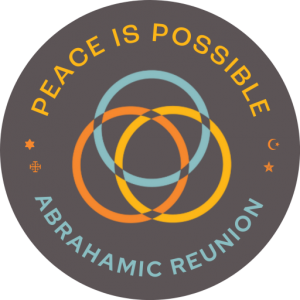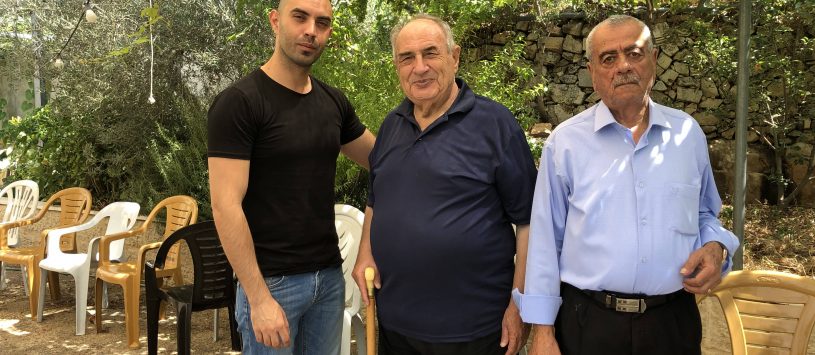
Written by Mohamad Jamous, Palestinian Director
July 2019 Event of the Abrahamic Reunion in Palestine
Every month we prepare ourselves for an event not like any other event. We prepare ourselves for an event that will give rise to happiness, an event that inspires hope and love to emerge from the hearts of some and to reach the hearts of many, through a bridge of love and peace.
Early this morning, at 8:00 AM, we left from our cities of Jenin, Nablus, Jericho and Ramallah to take buses to Ramallah city, a historically important city in Palestine.
Ramallah is a Palestinian city located in the West Bank, about 15 km (9.3 miles) north of Jerusalem, and it is the political capital of Palestine, making it one of the most important Palestinian cities.
It is considered to be the temporary administrative capital of the Palestinian National Authority.
It is also considered the Palestinian cultural capital due to the presence of a number of Palestinian cultural centers there, such as the poet Mahmoud Darwish Museum, and the Nelson Mandela Roundabout, and many other cultural centers.
Our first meeting was with a person loved by everyone in Palestine. He is known to everyone by the power of his words, his good spirit, the purity of his heart, and the intensity of his faith.
He is the originator of these famous words: “If they demolish your mosques, raise your prayers from our churches”
He is Father Manuel Musallam from Birzeit, Ramallah. Let me take a minute here to tell you about Manuel Musallam.
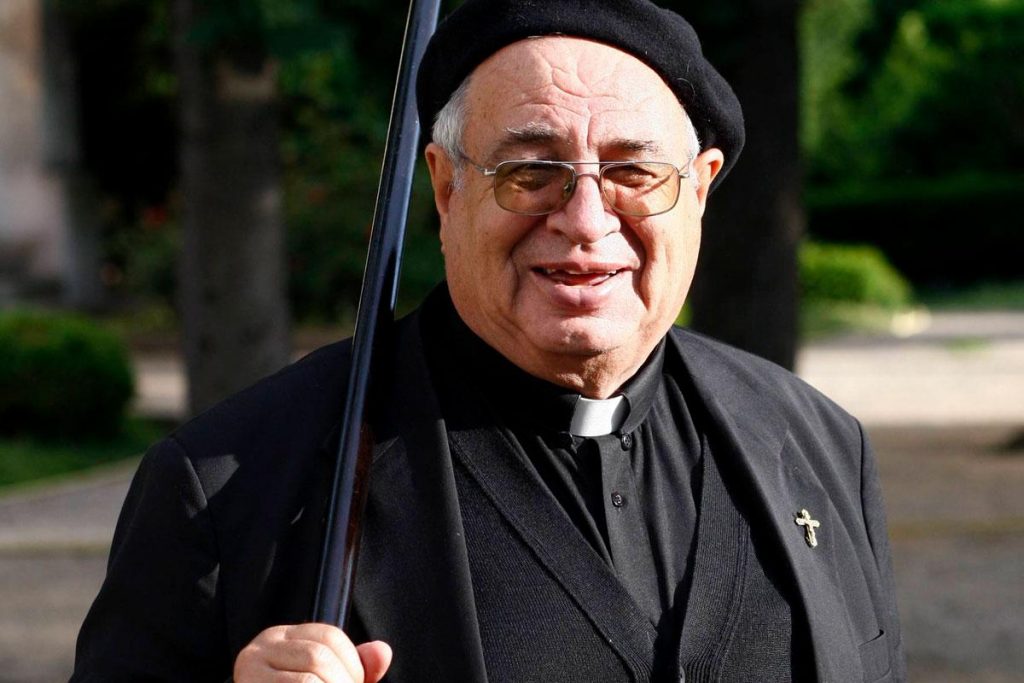
Father Manuel Musallam is a Christian cleric, a member of the Christian-Muslim Association for the Support of Holy Sites, and the pastor of the Latin Church in Gaza. He has assumed many religious and political functions and responsibilities. He served as an assistant pastor to the Latin parish priest in Zarqa, and in Rusaifa in Jordan from 1963 to 1968. Then he was a priest for the parish of Anjar in Jordan, then he was a priest for the parish of Jenin in Palestine, and then he was a Christian education teacher at the Terrasanta School in Nazareth.
In 1975, Manuel Musallam became a priest in the Catholic parish in Zababdeh in
Palestine, then he was a priest for the Catholic parish in Gaza from 1995 to
2009. That year he retired in his hometown of Birzeit and Pope Benedict awarded
him the title of Monsignor in January 2006.
We arrived at Musallam’s house at 10:00 AM in the morning and he greeted us together with his family and Imam Sheikh Mutasim Abu Romanah Muslim who is the Imam of the mosque in the town of Birzeit, Sheikh Mutasim Abu Romanah Muslim said: “I wanted to meet you here in my friend’s house, and not in a church or in a mosque, so we can all feel that we are one family!”
We all entered, and we sat in a circle under a vineyard in the courtyard of the house!
And here came this strange feeling, this beautiful feeling that you feel and see when people from different religions exchange talk and laugh, as if they are actually in a family meeting!
I welcomed everyone and I thanked Father Manuel Musallam and Sheikh Moatasem
Abu Romanah for their wonderful reception, then I introduction myself as the
program director of the Abrahamic Reunion in Palestine, and then I talked about
the objectives of our organization and the monthly activities that we do in
Palestine, Israel and abroad and the importance of these meetings.
Then I left it for Father Manuel to talk, and he began by saying:
I welcome you to your home, you are all a symbol of peaceful coexistence between religions.
We believe in you, we believe in these ideas, and we are the sons of this land, and we have made it’s history together.
He continued by saying:
God created the earth, and made humans to live there andrevive it, and God created many tribes, nations and peoples, who are different from one another in many ways. And sometimes these differences may appear to be drastic and some of the things that distinguish people from one another, may be their language, or their culture, their race, or their religion, and even though the religions on earth are many, everyone has the freedom to believe in what he wants.
There are no real differences between people except in their piety, because that is the only balancing factor that differentiates people. Therefore, there must be coexistence between religions for people to live on the Earth safely.
Coexistence between religions is one of the important factors that helps spread security, prosperity and peace among people. Positive relationships with followers of other religions, helps the status of all human beings.
In India, for example, there are many religions. Yet, as a nation religious tolerance and coexistence are promoted, because everyone recognizes the positive impact of peaceful coexistence. It is very clear that promoting brotherhood supports development and progress for everyone.
He continued
If you are not a Christian struggling together with your Muslim brother today and sharing in an equal struggle with all of your energy, you do not deserve to live with him in peace in the future, this land must end evil together, and together we will do good, God willing.
After Father Manuel Musallam finished his speech, the participants applauded him warmly.
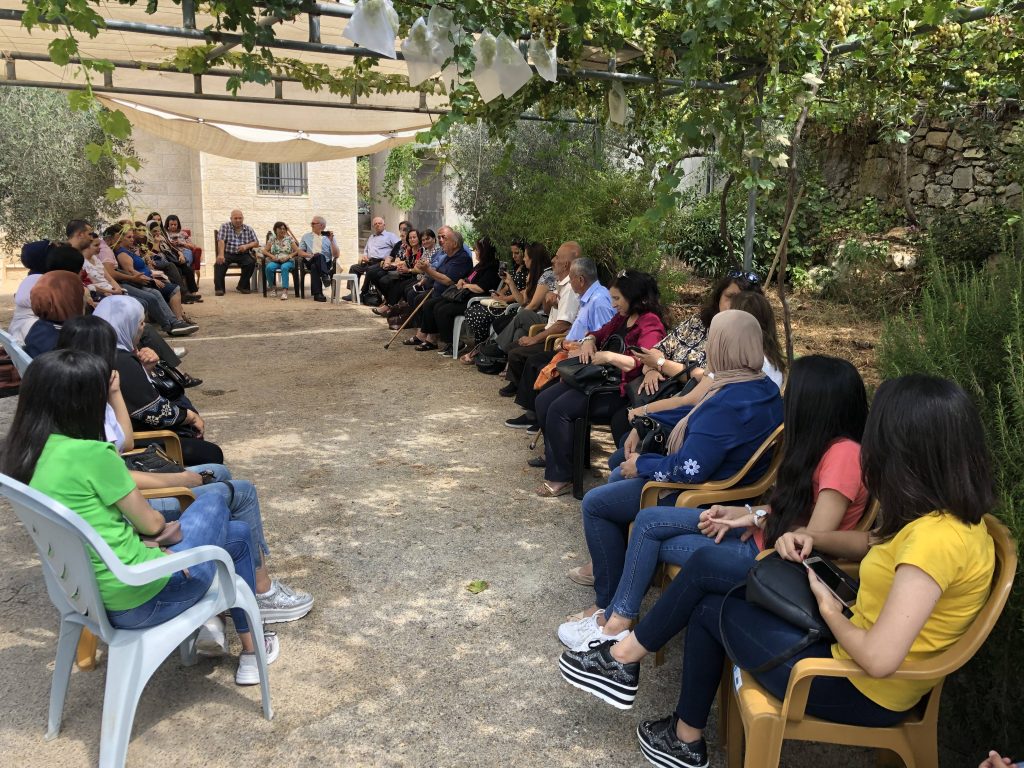
Then I invited the Imam of the town, Sheikh Mu’tasim Abu Romanah to give his speech and he began his talk and said:
Tolerance is a necessity in life. As long as there is a person practicing violence, and exclusion, he will reject the possibility of peaceful coexistence.
The need for tolerance is intensified due to the widening of ethnic and religious diversity. It is important to absorb the repercussions of friction between nationalities, cultures and religions, and move from the circle of confrontation to the level of co-existence and harmony.
Abu Romanah also described the current situation by saying:
Today when we witness the intense conflicts between nationalities, religions and doctrines it reveals an absence of the fundamental concept of tolerance.
When we look into the eyes of those who are involved in these circles of conflict, we will see that their moral values are controlled by social and political influences.
We will surly lose our way if we lose our moral credentials.
And what we really need to do is strengthen the relationships between communities and nationalities. This is a well-grounded concept that will avoid friction on the lines of contact.
This new concept of tolerance is not easily achieved, and its effectiveness depends on media responsiveness.
These are social and religious necessities, which is in the eyes of this speaker is a difficult task.
It is a long exercise, but one that is necessary in order to eliminate extremism in mankind.
It requires a careful return to the self so one can scrutinize and criticize these intellectual and ideological constructs within one’s own mind and heart, and work to cultivate and nurture a new value of tolerance.
So, I am very happy with the work that the Abrahamic Reunion doing in Palestine.
Thank you very much!
After Sheikh Abu Romanah finished his speech, the participants applauded him warmly.
Before you continue your reading, I want to share with you a feeling that I felt today! Do you know the feeling we feel when we meet with our families, relatives and friends like we are in a carnival? This is the feeling I felt today! I swear to you, I never felt this beautiful feeling before, I could see it in the eyes of the others. I could look into their eyes and see their happiness! I could see it in the faces of the others around me and I could see it in the smiles covering their faces!!
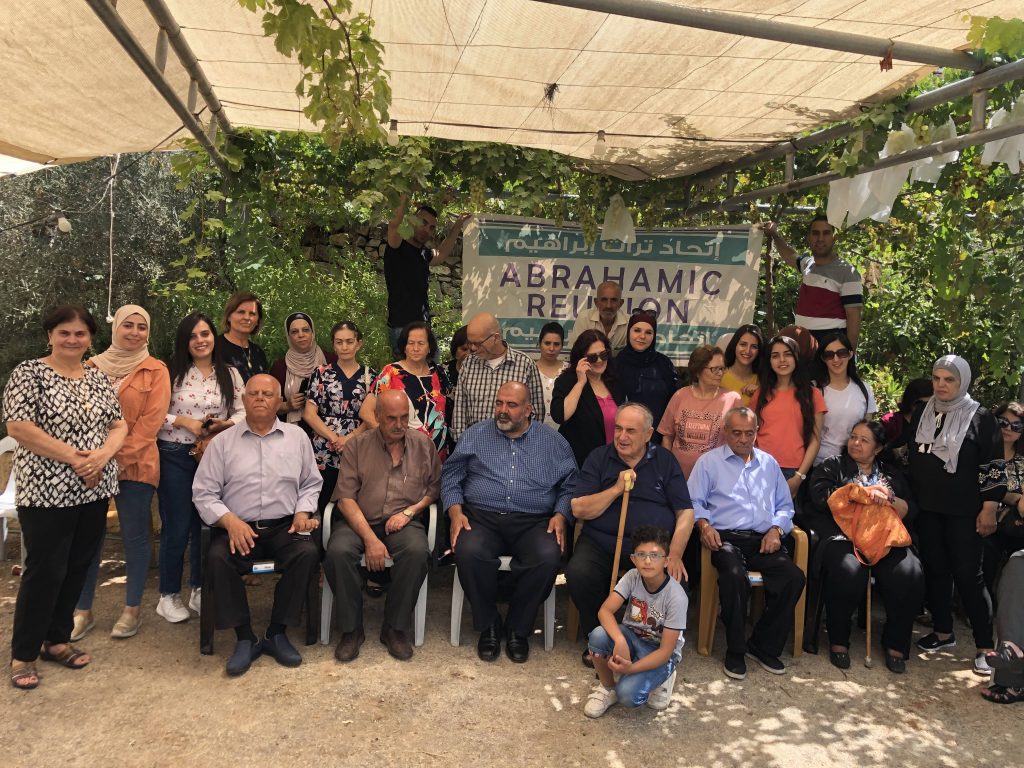
For a few minutes before we left the house, we all gathered to take a memorial photo together with Father Manuel Musallam, and his family, and Sheikh Moatasem Abu Romana under the vineyards in the olive groves. We could understand when some of the participants held back and refrained from joining us in the picture for their own reasons.
At 12 o’clock, after taking the memorial photo, we left this Muslim home to travel to the city center, specifically visit the spiritual head of the Roman Catholic Church, Father Abdullah Yulio.
The church was built in 1895 under the supervision of Father Jacob Magnum, and in 1951 the church bought another piece of land on which a school was built in 1962.
We arrived at the church at 12:30 PM and we were greeted by Father Abdullah Yulio. Sheikh Mohammed Asaad was also supposed to be there to receive us, but special circumstances prevented the Sheikh from being with us.
We all entered the church and were amazed by the magnificence and beauty of this building. It was decorated with crosses, the image of the Virgin Mary, and a large collection of images of the saints.
Before I continue, let me take a minute to tell you about Archimandrite Abdullah Yulio.
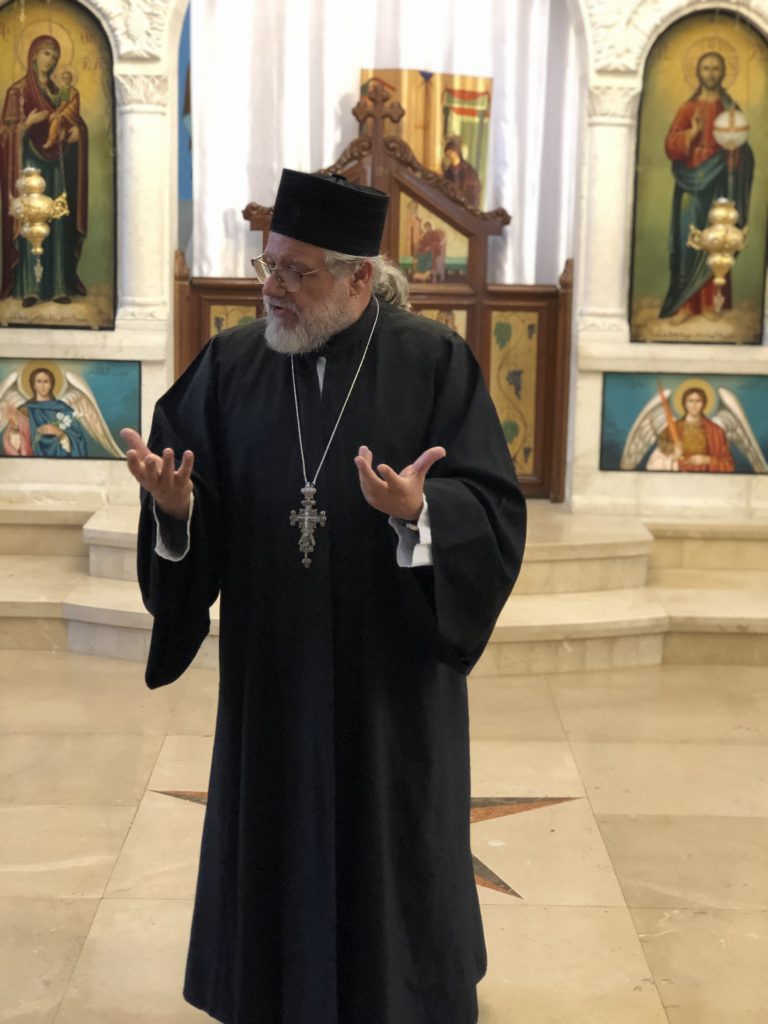
Archimandrite Abdullah Yulio was born and raised by an Arab family in Italy. Father Abdullah began his commitment to Palestine when he was working with the Palestinian Students Union in Italy and he continued to work under the Palestinian umbrella when he moved Lebanon to do his undergraduate studies. In Lebanon he joined the Greek Melkite Catholic Church based in Damascus. The congregation of the church was primarily Arab. Then he moved to Jordan where he worked for a few years, before he returned to Italy to serve as the spokesperson for the Palestinian community in the province of Tuscany. Six years ago, he returned to Palestine and is currently the head of the Greek Catholic Patriarchate of Jerusalem. He was in the ranks of solidarity with the uprising at Al-Aqsa Mosque on July 24, 2017 when the State of Israel prevented worshipers from entering the mosque and set up electronic gates for inspection!!
We all sat, and I thanked Father Abdullah Yulio for his beautiful reception in this beautiful church. I started to explain to Abdallah Yulio about the Abrahamic Reunion, and I described the important activities we do in Palestine and abroad. Then I invited Yulio to give his speech. He began and said:
Welcome Abrahamic Reunion to Ramallah, and welcome to your second home!
First of all, I want to say that I do not like to say this is a Christian, this is a Muslim, and this is a Jew. We are all the sons of Abraham, and we all worship one Lord. I often join Muslim worshipers on Friday, and I remember once when we were in solidarity in a tent in the Khan al-Ahmar area near Jericho, it was time for the Friday prayers for my Muslim brothers, and I moved away a little to make room for worshipers to start praying, and they came to me and said, “You must be with us.” And they brought me a chair to sit on so I could share in the prayers to God with them, and this is not the first time they have done this for me!
I always share with my Muslim brothers all their occasions and they share in my rituals. We in Palestine have one heart and one body. Palestine is the cradle of Christ, the place of the crucifixion, and resurrection of Christ, and the starting point of Christianity to the world. Christian roots in Palestine are as old as history, our Messiah was born in Bethlehem, Palestine, and this blessed land is the land of all religions, and Christianity is also rooted in Palestine, and on Arab land and it is as authentic as Islam. Hence, the relationship between the Arab Christian and the Arab Muslim is very important. And this relationship has always been important in history. It is can be understood under this one slogan, “To be or not to be.”
Christianity is a doctrine, as is Islam. It is very important to distinguish between religious beliefs and national belonging. There is a common past, a common present, and a common future. Arab Christianity has its own destiny and its own concepts. There is a malicious scheme that targets every Arab nation, and it aims to destroy the unity of this one nation.
We must work continuously to maintain a good relationships between Palestinian Christians and Muslims, and we must send this message to our brothers everywhere in the world. It is a message that says we embody this relationship on the ground, and in our daily living with our children in the market, and on the street, and it is not only at the level of elite intellectuals.
And he continued:
There must be one common religious discourse at home, at school, at the church and at the mosque.
I do not like to repeat the phrase “Christian brothers”. This is a term I do not like. Why we do not replace it with the phrase “Fellow Citizens”?
We do not want to be a minority, or a weak, or a vulnerable community.
We as Muslims and Christians are the landowners, the owners of the cause and the owners of the will.
When I meet any human being, I will not ask him to what sect or denomination do you belong? I will ask him, “What is your name?” And I will love him as he is. I hope that we will all be freed from this bottle.
I say to the Muslim you must give reassurance to the Christians so they will not look for reassurance from abroad, and you, O Christian, Arab consider yourself an Arab, and then consider yourself a Palestinian and then automatically move from the minority camp to the majority camp.
After the end of Father ‘s Yulio speech I opened a door for dialogue, discussion and questions from the participants, and some participants asked some important questions to Father Yulio .
Wissah Soudah from Jenin asked Father Yulio, “What role will Christian and Muslim clergy in Palestine take in order to continue these important activities of the Abrahamic Reunion?”
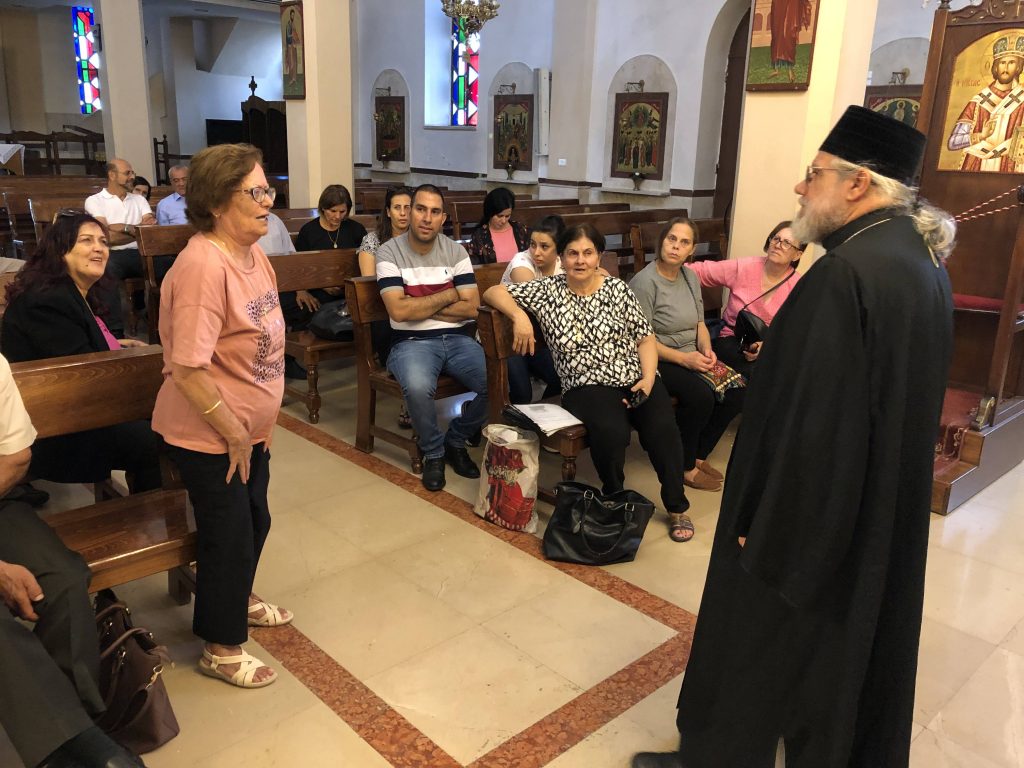
Yulio said:
In fact, I do not know of any group or organization other than you in Palestine. You are the only ones who hold these important meetings, and you must continue these meetings. And the clergy here are with you heart to heart.
I am here to tell you that I will stand with you and I will help you to expand these activities, which we need very much, and we will work together to amplify this work so it will reach everyone in Palestine.
After the participants finished asking Father Yulio questions, he invited us to drink coffee in a beautiful hall on the second floor. We all went and drank coffee and exchanged a variety of conversations and then we took a memorial photo with all of us inside that room.
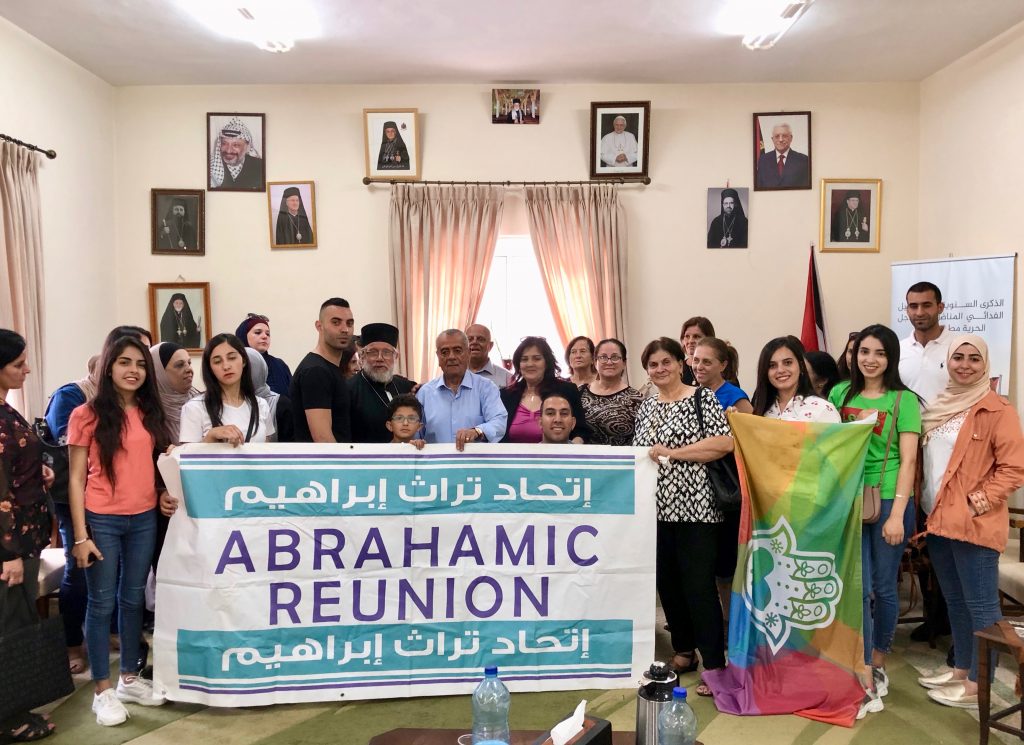
At 2:30 we all bid farewell to Father Yulio and we left the church to travel toward the Mahmoud Darwish Museum in the city center for a half hour visit.
Then we all went to the United Nations Park near the city center for lunch. We ate pizza and a variety of meat pastries, cheese, chicken livers and other dishes including chickpeas, beans, soft drinks, juices, water and coffee.
As we sat together and had lunch, we assessed the day’s activities by asking questions of the participants. They were all very positive about their experiences today!!
At four o’clock in the evening I bid farewell to the participants with the hope of meeting again next month and we all left the city safely.
Note: Some of the new participants declined to appear in the pictures for their own reasons.

